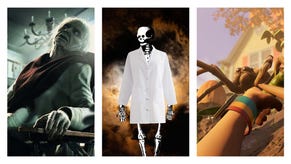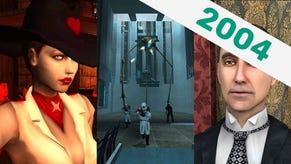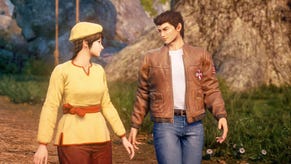Forever Young, The Tragedy Of Vampire: Bloodlines
The formerly forlorn future of RPGs
There's a bittersweet flavour to playing Bloodlines. It's not because of the vampiric moodiness and the twilight tales that it tells, nor the real-world tragedy of its costly development finally undoing brave development studio, Troika. No, the sense of sorrow comes from the realisation that there's nothing like this on the horizon. The idea is begged: why should there be so few games like this? Oh right, because it's so very hard to do.
Bloodlines - a clever, multi-faceted RPG - is a rare animal. Even under the blazing light of Fallout 3's recent release, there's a sense that we've not yet reached our promised land of games that do more, games that do worlds, games that do people. Bloodlines points the way to those games. Indeed, there's a sense that these games might just be becoming a myth. Like the plight of an animal species on the verge of extinction, the lack of games comparable to Bloodlines is one of the great tragedies of our time.
Our plight is this: if your great pleasure is hybrid action-oriented first-person role-playing games, with nuanced, open-plan stories filled with interesting characters, then your fantasy life is necessarily stunted. You have very few options. Games that offer a personal experience of worlds that we could never otherwise access outside of film and literature are rare. Ultra-violent warmonger, battlefield overseer, even sneaky thief man - these are all catered for in some way. But other, wider ideas are harder to come by. What, indeed, would it be like to live life as a 1950s private detective, or an FBI agent, or a nano-tech enhanced super agent of the near future, or a vampire?
Not many games bother with such wide open scope. Bloodlines does. And it does what a select few videogames have articulated: giving us sudden, direct access to something wonderful and alien. But it's drama, and pseudo-social, as much as it is videogame action. It is filled with brilliant artificial people. Bloodlines allows us - like a participant in some larger soap opera - to make decisions about what might happen to those individuals. In this case, it's always something wonderfully dark. Bloodlines manages to be funny, humane (if not human), brutal, horrifying, and thrilling, all at once. Its vampires are larger than life and yet nevertheless alive. Their twisted traits come tumbling out in excellent dialogue and strange quests. It is heavy on heavy themes, ideas that might otherwise pervert the purity of any other action game. Seduction, sedition, schizophrenia, propaganda, pornography, purgatory: these thematic notions are the lifeblood of vampire fiction, and they're essential what's going on in here. The struggle between the vampire castes is at once noble and despicable, and picking your route between its pitfalls is a delight. Ultimately, though, this is about exploration: about seeing something out of the ordinary. Toxic tourism in vampiric clubland.
Bloodlines is something like an action soap-opera. I truly wish I could say that of more games. So few games have attempted to access this most natural of game approaches: analogy of the real world, with conversation and violence intermingled, rather than simply delivering uninterrupted carnage, or endless management. These 'immersive sim' games are tough to make, granted, but when you play something like Bloodlines they also feel like they're the games we deserve. Game developers often talk about the strange sense of entitlement that gamers seem to bring to their hobby, but when you taste games like this, it becomes entirely understandable. To be to be stealthy or stabby, seductive or violent, well, it's almost like the game is spoiling us with options. After ten hours in Bloodlines you're struck by the nagging concern: why aren't other studios reaching for the stars like this? Even Bioshock and Stalker seem vapid in their shooter-obsessions.
Of course, it's a matter of complexity. To make a game like Bloodlines is a task of terrifying scale. It's one thing to make a game about running around putting bullets into people, and quite another to make it the tale of a weak young vampire who can talk to almost anyone in a series of thriving city hubs, travelling back and forth between them amid of a web of quests that range from simple puzzle solving, through the seduction of innocent human victims, to the brawling battles with rival monsters. To make this, you really have to know what you're doing. And therein lies the crux of the matter, the black heart inside the game: the crucial problem with Bloodlines was its complete and utter brokenness on release. Troika had tried to reach the highest peaks of game design, and faltered, and then fallen. My first journey through this glitchy underworld left my character stranded in a sewer pipe. I never did get any further and, savegame deleted, his weird adventure game to a permanent end. Getting past that point months later sent me trudging into endgame of horrifying hack-and-slash tedium, where nothing of the early game intricacy remained to give us respite from the melee. Even if you didn't get that far, a sojourn with Bloodlines exposed you to animation failures, spelling mistakes, and all other kinds of design splatter. This was not a finished game. Bloodlines, despite all its riches, was incomplete.
Ultimately the lamentable collapse of the final act of the game cannot be fixed without money and studio expertise, but many of the other problems have been dealt with. I've played through now with the community patch, and dozens of problems have been fixed. Dialogue trees have been trimmed and punctuated, animations have been been altered and replaced, bugs have been uncovered and squished beneath a fashionable gothic boot heel. Hell, the original boxed version of the game had glitches in the opening cutscene. Those have been mended. Bloodlines is so very far from perfect, but it is perfectly far from almost any other game we could pick up and play today. If you've not sunk teeth into it, then I fear you're truly missing out.
A shorter version of this article first appeared in PC Gamer UK.


















